
This section provides players with additional rules needed to play their first game.
District Components
A district can contain numerous components that represent the status of that district. Each of these components is described below.
Human First Unit (Enemy unit)

Human First is the organization at the forefront of anti-android activism, instigating unrest and violently sabotaging businesses that employ androids.
When a district with a Human First unit is exploited, unrest increases by two stages instead of one. If unrest cannot increase by two stages, place an outage token in that district's condition box, returning any unrest token there to the reserve.
Orgcrime Unit (Enemy unit)
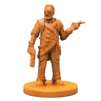
The diversity of the city's criminal elements is second to none. From street gangs like the Pistoleros to the highly organized Tri-Maf syndicate, crime has a vested interest in the many vices and needs of New Angeles.
When a district with an orgcrime unit is exploited, it cannot produce its primary resource. If the district only has one resource type, it cannot produce any resources.
Prisec Unit
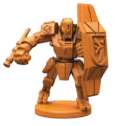
Be it proxy war, corporate sabotage, or just a good, old-fashioned protection racket, many opportunities exist for private security professionals.
Of course, there are risks, and one can never be sure of who has paid the highest price for a merc outfit's loyalty.
Prisec units protect districts by preventing enemy units from remaining in them. If an enemy unit and a prisec unit occupy the same district, that enemy unit immediately moves (movement is explained later).
Outages

Power outages and other failures of infrastructure remain a reality of the near future in a sprawling megalopolis like New Angeles. The city relies on connectivity for personal and business purposes, so any interruption of service is unforgivable.
Districts in outage cannot produce any resources. When a district suffers an outage, place an outage token in its condition box, returning any unrest token there to the reserve.
Unrest
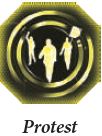
The laborers of New Angeles lose jobs every day to cheap and efficient android labor, which is supplied by megacorporations who have enormously widened the gap between rich and poor.
With unemployment at a record high, civil unrest is never far from erupting.
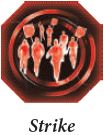
There are three stages of unrest in a district: stable, protest, and strike. Unrest increases from stable to protest and from protest to strike; unrest decreases in the opposite order.
When a district's unrest increases from stable to protest, an unrest token with the protest side faceup is placed
in that district's condition box. When unrest increases again, the unrest token is flipped from its protest side to its strike side. A stable district or a district in protest functions normally; however, a district in strike cannot produce any resources.
Illness

Common illnesses remain a significant cause of reduced productivity, and synthetic diseases are a growing threat to workforce stability.
When an action card is resolved, if it involves one or more districts that have an illness token, threat is increased by two. A district is involved in the resolution of an action card if any unit or token is placed into or removed from that district. It is also involved if a unit or token moves into or out of that district.
Android Tokens

Android labor is a reliable and effective source of labor that can be readily relocated without complaint. The profit a corporation can reap via androids is greater than the losses caused by the inevitable protests resulting from their deployment.
During the Production Phase, each district that contains an android token is exploited and produces its resources. A district cannot have more than one android token.
Developments

The New Angeles skyline changes constantly as corporations construct massive arcologies and manufacturing facilities. Combined with android labor, newly developed facilities can quickly increase output.
While a district contains a development token, the quantity of its primary resource is increased by one. A district cannot have more than one development token.
Space Restrictions and Movement
A district cannot have more than one copy of an outage token, illness token, and each enemy unit. If any of these components are placed in a district that already has a copy of that component, the component must move. Additionally, when an enemy unit and a prisec unit occupy the same district, that enemy unit must immediately move.
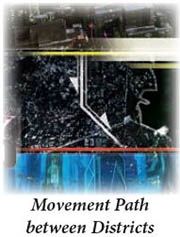
Districts are connected by movement paths. Each district has one exiting movement path that points to another district. To move a component, place it in the district pointed to by the exiting movement path.
If the next district also already has a copy of that component, it moves again. This process continues until the component moves to a district that does not already contain a copy of it, or until it moves into "The Root" (the red circle).
If an enemy unit, outage token, or illness token moves into "The Root", that component is returned to the reserve and threat is increased by two.
Moving units example:
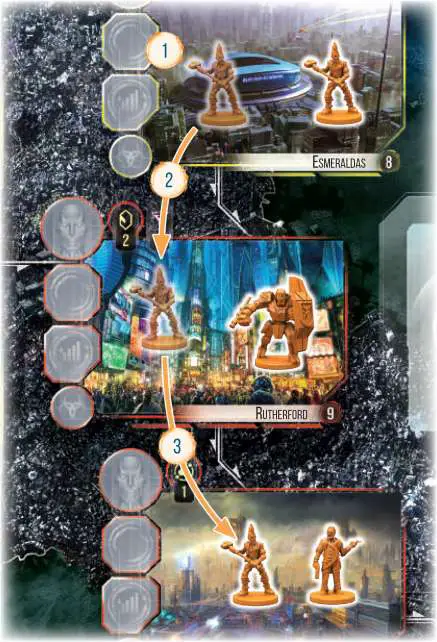
An event card instructs the players to place a Human First unit in Esmeraldas (8).
There is already a Human First unit in Esmeraldas, so the Human First unit moves along the movement path to the next district: Rutherford (9).
Rutherford (9) contains a prisec unit, so the Human First unit must move again to Base de Cayambe (10).
Corp Sheet Contracts
Each corp sheet includes a printed contract. Contracts provide capital to a corporation when the described condition is met while resolving an action card.
When the condition on a corp sheet is met, that corporation gains the indicated capital regardless of which player resolved the action. If a condition requires a component to be removed from a district, removing a component from "The Root" does not satisfy that condition.
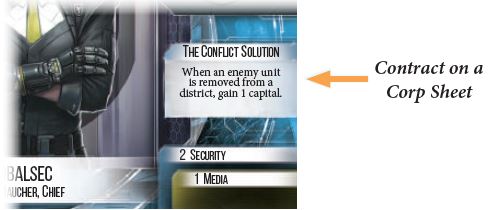
Assets
Asset cards represent executives, crime bosses, celebrities, and others whose allegiances follow the cash flow. They provide players with unique and powerful abilities.
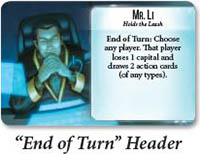
When a player claims an asset, he places it faceup next to his corp sheet. He can use asset card abilities as described on the cards.
If he has any assets with the "End of Turn" header, he can use each once at the end of each of his turns.
Some assets require a player to exhaust them to resolve their effects. To exhaust an asset card, it is rotated 90 degrees clockwise. An exhausted card cannot be exhausted again. A player readies his asset cards at the start of his turn by rotating them 90 degrees counterclockwise.
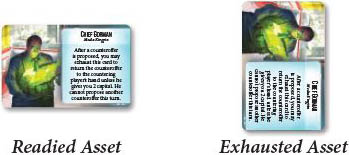
Some assets must be discarded to resolve their effects. When an asset is discarded, place it at the bottom of the asset deck.
Discard Pile
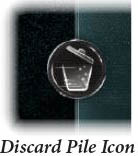
All action cards are discarded facedown to a single discard pile next to the lower- right slot on the board with the garbage can icon. When a player must draw an action card but no cards remain in that deck, the cards in the discard pile are shuffled, sorted by type, and then shuffled into their respective decks.
Actions cards are always discarded facedown. Players cannot lMooekdIaat facedown cards when they aLreadbiosRcarded nor while they are in the discard pile.
Trading
Players are highly encouraged to influence other players via any means necessary. As such, players can give or trade their capital and assets to gain support during a deal, to encourage certain actions to be played, to swap assets, etc.
All promises made by players concerning the future are non-binding-players can make promises and not fulfill them. However, if both players can immediately and completely fulfill the terms of the trade, they must do so.
Example: Globalsec agrees to give Jinteki two capital if Jinteki supports Globalsec's offer with two cards. If they agreed to these terms when it is Jinteki's turn to abstain or support, the terms are binding and must be fulfilled.
If Jinteki promises to support Globalsec but it is not Jinteki's turn to play support, the terms are not binding; Jinteki receives the capital but is not required to play cards in support.
Emergency Actions
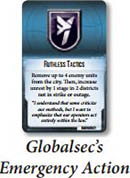
Emergency action cards are unique and powerful action cards that can greatly impact the state of the city. Each player starts the game with the emergency action card that matches his corporation. These cards are not part of a player's hand of action cards; they are kept faceup next to his corp sheet.
Emergency action cards can be proposed as offers just like normal action cards. Instead of being discarded, however, a proposed emergency action card is returned to the player with the matching corporation.
If the card was the winning offer for the deal, it is returned facedown and cannot be used again unless a card effect flips it faceup. If the card was not the winning offer, it is returned faceup and can be used again.
The Federalist
The corporations generally prefer the freedoms and risks of being an extra-territorial special commerce region to the rules and regulations of the United States federal government. However, there is always a chance that someone will seek a more lucrative opportunity through sweetheart deals and no-bid contracts with the Feds.
The player who is dealt the "Federalist" rival card is the federalist. The federalist does not win the game like the other players. Instead, he wins the game when the threat token reaches "25", but only if he has at least 25 capital at that time. If he does not have 25 capital at that time, he loses the game along with the other players.
For the federalist to increase threat and accomplish his goal, he needs to work against the city, such as by resolving action cards in districts with illness tokens and by supporting suboptimal offers proposed by other players.
Most importantly, he must be careful to hide his identity for as long as possible! The other players are likely to work as a team against a known federalist, and the federalist needs the other players' cooperation to have any chance of accumulating 25 capital.
It is possible for the game to have no federalist if the "Federalist" rival card is the card placed under the board during setup instead of being dealt.
Continue Reading
